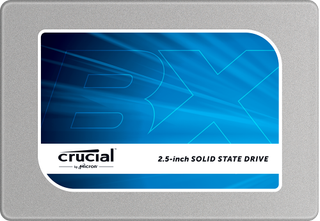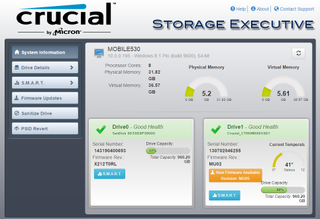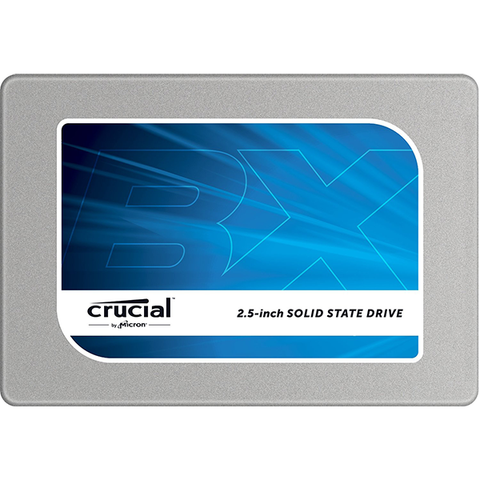Early Verdict
Encryption hasn't taken off for consumers and we've found that price often matters more than advanced features or even the best performance available. First and foremost users want reliability, then low price and finally acceptable performance. SSDs by nature are faster than spinning disks so performance is covered. Crucial made it possible to check the boxes next to reliability and price making the BX100 a solid value for consumers.
Pros
- +
Price, Software, Warranty
Cons
- -
Low random performance, No hardware encryption
Why you can trust Tom's Hardware
Introduction And Specifications

Crucial's SSD portfolio looks a lot like what you find in the video card market. It goes beyond the standard low-cost, mid-range and flagship tiers used by most companies. With several products available and two controllers offered, the lines often blur.
The company's new MX200 and BX100 make the 1TB capacity class mainstream-accessible. Its MX200 would naturally replace the eight-month-old MX100, but Crucial tells us the current product line is only expanding and not replacing existing models. With that said, the BX100 we're testing today gives Crucial a product to compete in the hard disk replacement category. This classification is a polite way of addressing the lowest-priced SSDs on the market. Crucial wants to tempt buyers into purchasing an SSD instead of a hard drive.
In order to hit the price point it's hitting, Crucial taps Silicon Motion's SM2246EN controller. Crucial and SanDisk were the first flash fabs to adopt the SM2246EN. But several third-party vendors already have low-cost SSDs with the processor.
Crucial is aware that its competition has nearly identical products. The BX100 launch became a favorable time for the company to release its first SSD Toolbox utility. Crucial calls the browser-based software Storage Executive, and it offers all of the usual toolbox tricks like secure erase, firmware updates, SMART monitoring and a PSID reset tool (for hardware encryption, when available).
Technical Specifications
To attract a wider range of customers, Crucial launched the BX100 in four capacities. The series starts at just $70 for the 120GB model, which is an attractive price point for notebook users that mainly surf the Web. At the other end of the scale, gamers on a limited budget can fit all of their favorite titles on the higher-capacity models.
All four products read sequential data at up to 535 MB/s. The Silicon Motion SM2246EN four-channel controller has a year-long history of delivering exceptional read performance in other products. But with SSDs today, your money is spent on write performance. The higher-capacity models deliver 450 MB/s sequential write speeds, which is around 100 MB/s lower than most performance-oriented SSDs. The two lowest-capacity drives are slower still, topping out at 370 MB/s for the 250GB version and 185 MB/s for the 120GB.
That smallest BX100 also takes hits to random performance, topping out at 43,000 random write IOPS, while the three larger sizes push up to 70,000 IOPS. Random read IOPS are more steady. The lowest-capacity drive is rated at 87,000 IOPS and the larger ones reach up to 90,000.
The BX100 doesn't include many of the technologies we expect from new SSDs these days. Hardware encryption is absent, as is DevSlp support. Buyers in this price range tend not to worry much about FDE, but any capability able to extend notebook battery life would be nice. Fortunately, the four-channel controller sips power, so the feature isn't missed much.
Pricing and Accessories
Crucial's 120GB model sells for less than $70, and the 250GB model is $100. At those prices, it's easy to see why the BX100 is already a hot item. And the value keeps getting better as the drives get bigger. Crucial's 500GB lands at $184, and the 1TB BX100 we're reviewing today goes for $375.

You get a 9.5mm adapter in the retail package. However, its real highlight is Crucial's Storage Executive software. The utility doesn't physically come from the box, but the BX100 family works with this downloadable software that adds extra value.
Current page: Introduction And Specifications
Next Page A Closer Look At The BX100 1TB-
salgado18 My only issue with the drive is endurance. Because a secondary drive for storing data is meant to be the safe repository, wouldn't a hard drive be a better match, even with the lower performance?Reply -
logainofhades You can currently get an 850 evo for less than a BX 100. http://pcpartpicker.com/parts/compare/crucial-internal-hard-drive-ct1000bx100ssd1%2Csamsung-internal-hard-drive-mz75e1t0bam/Reply -
MrMusAddict "As a subsidiary of Lexar, parent company of Micron, Crucial has access to the highest-quality flash before competing drive vendors can buy it up."Reply
You have it backwards there. It should read:
"As a subsidiary of Micron, parent company of Lexar..." -
Chris Droste i Love my MX100 512GB but i dunno if I'd go anything cheaper than that unless it's older/proven like a Samsung 830 or a Crucial m.4. i mean, $210 for 512GB is really damn sweet for a +90k IOps driveReply -
dachiesa I grabbed a $85 sale for the 256GB one and upgraded my 120GB Kingston SSDNOW to this and I am very happy to have that extra space (the 120GB Kingston was 60 when I bought it last summer)Reply -
mczak1 The last page is saying "The cheaper controller is missing advanced features like DevSlp support and hardware-based encryption" - that is however untrue as far as the encryption is concerned (look it up on SiliconMotions site). I guess though Crucial decided to not make it available so there's some feature difference to the MX series. There could of course be some problems with it as well, but other SSDs based on the same controller offer hardware based encryption.Reply -
mapesdhs Re the 128KB Sequential Write Performance graph - please stop using graphsReply
that do not have a zero origin. They are thoroughly visually misleading. What's
the point of using a graph at all if the bars' relative sizes are so different because
of a non-zero origin? The line graph makes it obvious the BX100 is slower but
not that much slower than the upper end models, whereas the bar graph at
first looks far worse. Also, the other graphs have not been done in the same way.
Best not to use non-zero-origin graphs at all.
Ian.
-
SinxarKnights ReplyTime to move to a 1Tb SSD from a 256gb one I have now, this may be the one get.
I got the MX100 256GB and simply love it. I would like to get this and just use it for storage. I mean it would last pretty much forever since it isn't mechanical and the data isn't constantly being written to it.



